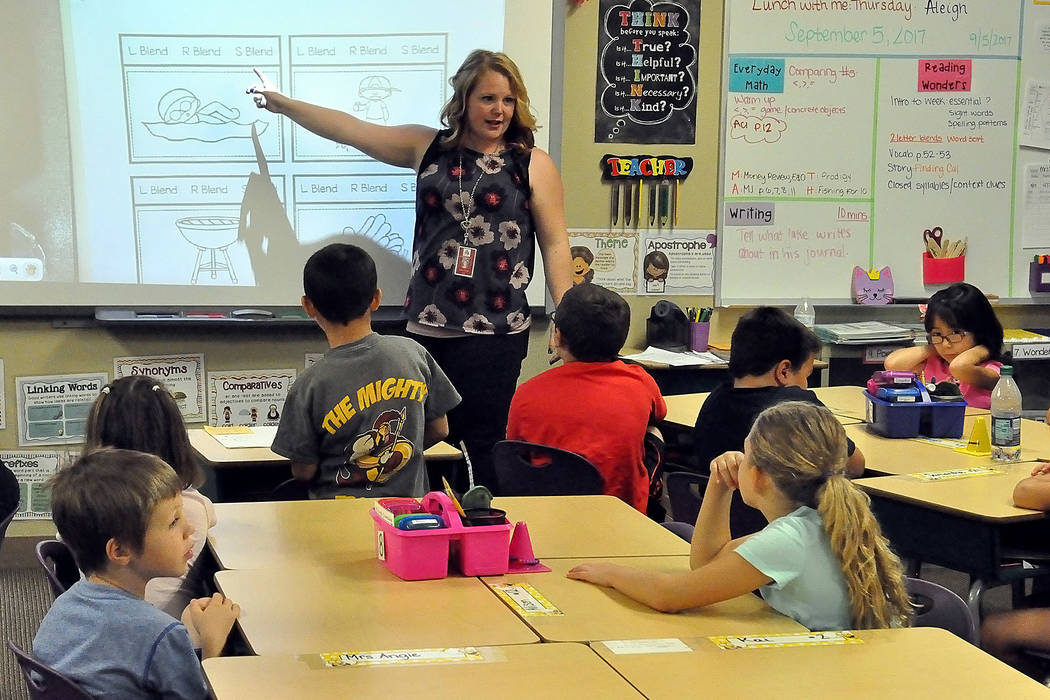A look at the impact of new tax law on education in Nevada

Two hundred and fifty dollars.
That figure – the amount that teachers can deduct from their taxes for classroom expenses – drew lots of attention in late 2017 when one of two dueling federal tax bills threatened to eliminate it. Ultimately the tax bill signed into law by President Donald Trump in December spared the deduction.
But there’s more to the new tax code that impacts education — both the good and the bad.
For one, families can now use 529 plans to pay for private K-12 tuition. Those plans, originally only for college expenses, allow parents to save money in an investment account where earnings are tax-free.
School choice advocates are praising the change — particularly in the battleground state of Nevada. It won’t help all families, but could assist those that are able to save.
“Anything that provides choice and brings choice is a step in the right direction, and that’s what we truly believe,” said Valeria Gurr, state director of the Nevada School Choice coalition. “We completely support those families that have a 529, but we’re also concerned for the families that don’t have one, and those are typically the low-income families who don’t have the extra money to save for this.”
As of last June, 16,385 Nevada families had money in one of the state’s 529 plans, according to the treasurer’s office.
Other changes could mean big losses for school districts.
School districts won’t be able to “advance-refund” bonds, which are typically used to pay for long-term capital needs. Refunding a bond is similar to refinancing a mortgage and allows districts to obtain lower interest rates on long-term debt. Advance refunding enables districts to try to obtain lower interest rates earlier, saving even more money.
Since 1998, the district has saved over $502 million by refunding its bonds, most of it through advance-refunding, according to the district.
“These tax reforms are going to hurt school districts all the way around,” said Sharie Lewis, a financial officer with the Parkrose School District in Oregon and a member of the Association of School Business Officials International. “It’s going to pretty much put a kibosh to some of your creativity on how to get funding.”
Another change that worries experts: Deductions for state and local taxes, or SALT, on federal returns are now capped at $10,000. The law also roughly doubles the standard deduction, which means fewer people are likely to itemize their returns, according to the national Government Finance Officers Association. Married couples who file jointly, for example, can now deduct $24,000.
What does that have to do with schools? The association claims that limiting the deduction will make local tax increases for education harder to swallow. Voters won’t be incentivized to deduct those taxes on their federal returns and wealthier people will likely already be at or beyond the deduction cap.
While that’s a bigger problem in high-tax states such as those in the Northeast, Nevadans still take advantage of SALT — 25 percent of tax returns used that deduction in 2015 for an average savings of $5,989, according to the finance group. That average figure is still lower than the current standard deduction for both single and joint filers.
Measuring the exact impact of the new tax law is still tough at this early stage — but rest assured it will extend beyond $250 of school supplies.
Contact Amelia Pak-Harvey at apak-harvey@reviewjournal.com or 702-383-4630. Follow @AmeliaPakHarvey on Twitter. On Education appears every other Saturday.













